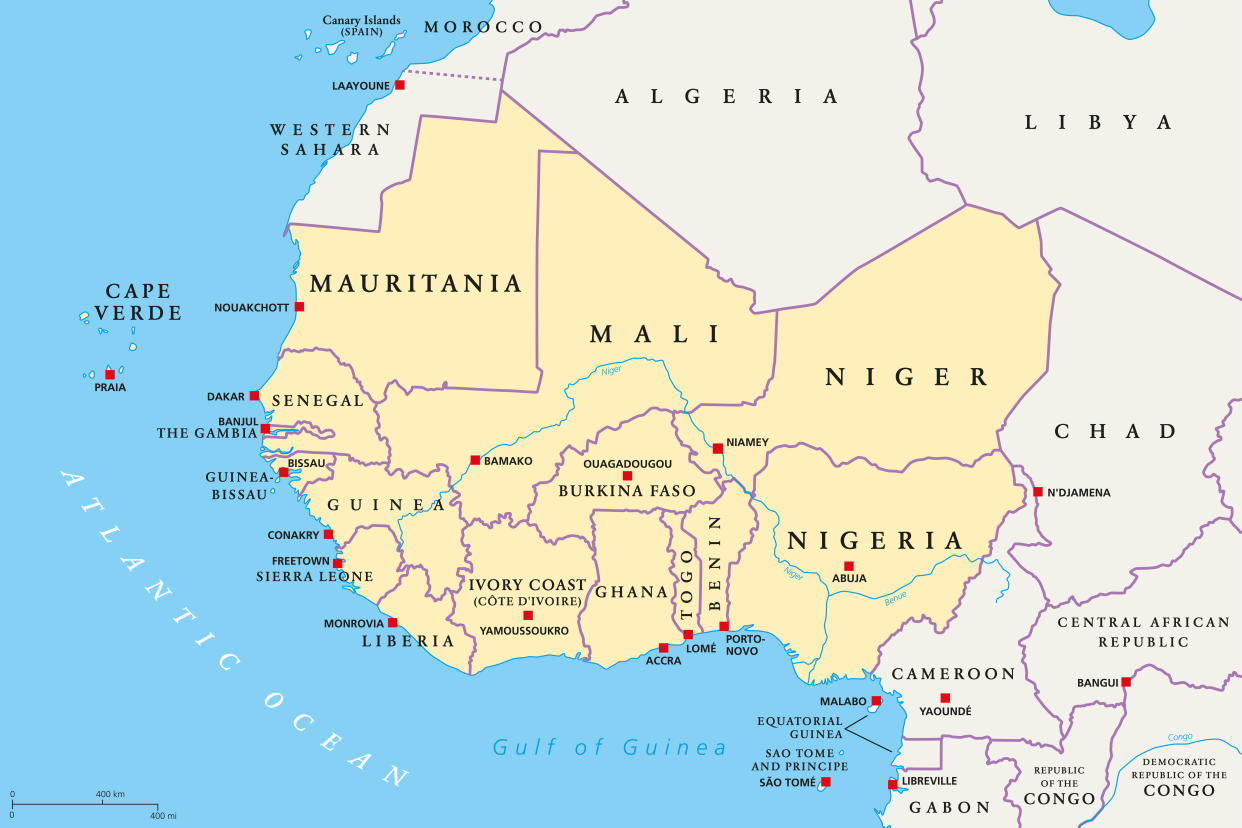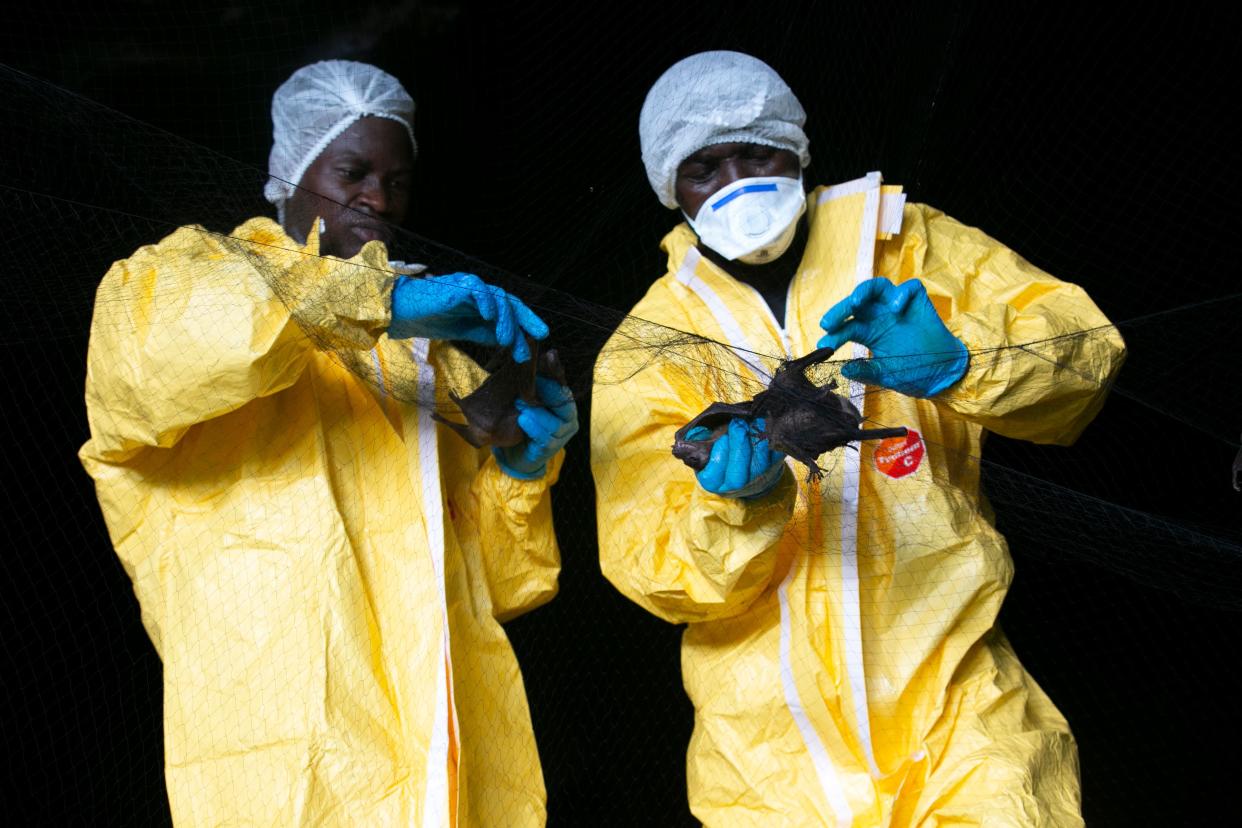Marburg virus: Everything we know about the deadly disease detected in Africa
A highly infectious virus similar to Ebola has been found for the first time in West Africa, leaving one man dead.
The World Health Organization (WHO) said that health authorities in Guinea had confirmed one death from Marburg virus.
Four people have been identified as high-risk contacts of the man, the WHO said. He had sought treatment at a local clinic before his condition rapidly deteriorated.
In a statement, the WHO's Regional Director for Africa, Matshidiso Moeti, said: "The potential for the Marburg virus to spread far and wide means we need to stop it in its tracks.
"We are working with the health authorities to implement a swift response that builds on Guinea's past experience and expertise in managing Ebola, which is transmitted in a similar way."

What is Marburg virus?
According to the WHO, Marburg virus disease is a highly virulent disease that causes haemorrhagic fever.
It is in the same family as the virus that causes Ebola.
What are the symptoms of Marburg virus?
Illness caused by Marburg virus starts "abruptly", according to the WHO, with high fever, severe headache and severe malaise. People may also experience muscle aches and pains.
Symptoms including severe watery diarrhoea, abdominal pain and cramping, nausea and vomiting can start on the third day and diarrhoea can last for a week.
The WHO says: "The appearance of patients at this phase has been described as showing 'ghost-like' drawn features, deep-set eyes, expressionless faces and extreme lethargy."
Read more: Factfile: The Marburg virus, Ebola's deadly cousin
Patients can also experience a non-itchy rash. Within a week many patients suffer from bleeding from multiple areas including the nose and gums.
In fatal cases, death usually occurs between eight and nine days after onset, the WHO says, usually preceded by severe blood loss and shock.
The US Centers for Disease Control and Prevention (CDC) says symptom onset is sudden following an incubation period of five to 10 days, and is marked by fever, chills, headache, and myalgia (muscle pain).
It says a rash can start around the fifth day, followed by nausea, vomiting, chest pain, a sore throat, abdominal pain and diarrhoea.
Symptoms become increasingly severe and can also include jaundice, inflammation of the pancreas, severe weight loss, delirium, shock, liver failure, massive haemorrhaging, and multi-organ dysfunction.
The CDC adds: "Because many of the signs and symptoms of Marburg haemorrhagic fever are similar to those of other infectious diseases such as malaria or typhoid fever, clinical diagnosis of the disease can be difficult, especially if only a single case is involved."
Watch: 3 people in Uganda died from the Marburg Virus
Have there been Marburg virus outbreaks before?
Marburg virus was initially recognised in 1967 following two large outbreaks that occurred simultaneously in Marburg and Frankfurt in Germany, and in Belgrade, Serbia, according to the WHO.
The outbreak was associated with laboratory work using African green monkeys (Cercopithecus aethiops) imported from Uganda.
Since 1967 there have been 12 major Marburg outbreaks, mostly in southern and eastern Africa.
Read more: WHO: Guinea Ebola outbreak likely from human source
In 2008, two independent cases were reported in travellers who visited a cave inhabited by Rousettus bat colonies in Uganda.
The case reported this week is the first time the deadly disease has been identified in West Africa.
How is Marburg virus spread?
Marburg virus is transmitted to humans from fruit bats and then spreads via bodily fluids.
According to the WHO, Marburg can spread through human-to-human transmission via direct contact (through broken skin or mucous membranes) with the blood, secretions, organs or other bodily fluids of infected people, and with surfaces and materials (e.g. bedding, clothing) contaminated with those fluids.

According to the European Centre for Disease Prevention and Control (ECDC), both European Ebola and Marburg virus diseases are not airborne diseases and are generally considered not to be contagious before the onset of symptoms.
It says: "Transmission requires direct contact with blood, secretions, organs, or other bodily fluids of dead or living infected people or animals.
"Therefore, the risk of infection is considered to be very low if appropriate infection prevention and control precautions are strictly followed."
Is Marburg virus deadly?
Marburg case fatality rates can be up to 88%, with past outbreaks varying from 24% to 88% depending on virus strain and case management, according to the WHO.
However, the US CDC puts the case-fatality rate at 23-90%.
How do you treat Marburg virus?
According to the WHO, there is no proven treatment yet available for Marburg virus disease, although treatments including blood products, immune therapies and drug therapies are being explored.
Treatment for specific symptoms as well as rehydration with oral or intravenous fluids can improve chances of survival, the WHO says.
Is there a vaccine for Marburg virus?
In a recent statement, the WHO director-general Dr Tedros Adhanom Ghebreyesus said there is no licensed vaccine for Marburg, although there are vaccines under development.
He said the WHO is working with partners to seek opportunities to assess those vaccines.
Watch: How the world could be better after COVID


